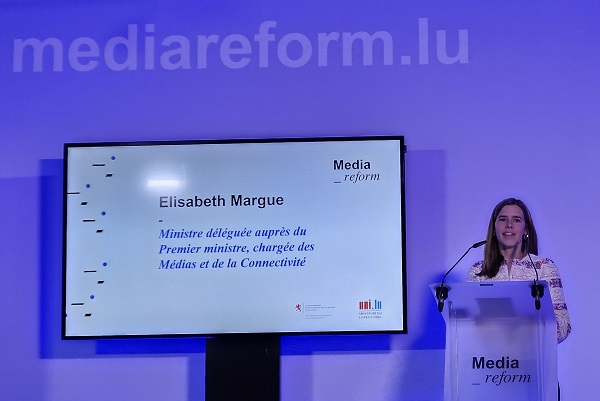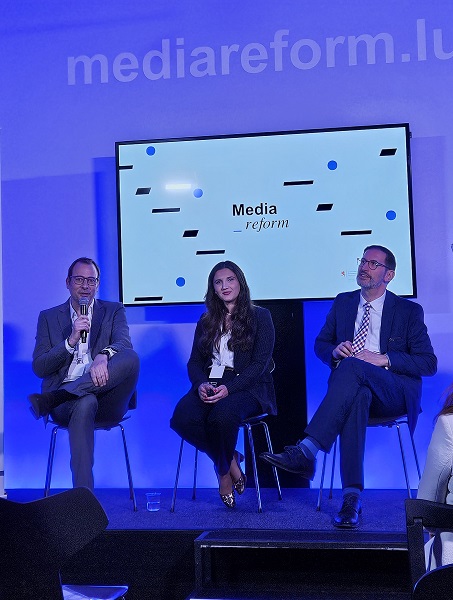 Elisabeth Margue, Minister Delegate to the Prime Minister for Media and Connectivity;
Credit: Jazmin Campbell / Chronicle.lu
Elisabeth Margue, Minister Delegate to the Prime Minister for Media and Connectivity;
Credit: Jazmin Campbell / Chronicle.lu
On Wednesday 15 May 2024, the first in a series of conferences about the planned reform of the Electronic Media Law in the Grand Duchy took place at Casino Luxembourg.
This new conference series looks at possible changes to the Electronic Media Law, which has undergone several revisions but has not been globally reassessed since its entry into force 1991, noted the organisers on their website. To face new challenges, there appears to be a need for an in-depth reassessment of media legislation to ensure effective regulation adapted to current and future realities. These public conferences, organised by Luxembourg's Department of Media, Connectivity and Digital Policy (SMC) in collaboration with the University of Luxembourg, form part of this process.
The multilingual opening conference kicked off with an introduction (in French) by Dr Raphaël Kies, research scientist and coordinator of PLDP. He touched on the significant changes media and technology have undergone over the years, as well as the challenges and various EU regulations in these areas.
In her welcome address (in Luxembourgish) on Wednesday evening, Elisabeth Margue, Minister Delegate to the Luxembourg Prime Minister for Media and Connectivity, highlighted the importance of media for democracy. She touched on some of the challenges, in a world where anyone can take out their smartphone, create content and quickly upload it to the internet. The minister thus emphasised the need for media education, starting from a young age, as well as ensuring safe sources of information for the public. She acknowledged that much has changed since the 1991 amended law on electronic media and that an "effective framework" is required for an "effective regulation" that is fit for the future.
The evening continued with a presentation (in French) of the Medialux project, during which Dr Raphaël Kies and Dr Stéphanie Lukasik, researcher and project coordinator, outlined the first results relating to the media landscape and media uses in Luxembourg. The project aims to produce and share quantitative and qualitative information on the media landscape and its evolution with the objective of maintaining and developing a diverse and sustainable media landscape in the Grand Duchy. The speakers mentioned in particular the Media Pluralism Monitor (MPM) and Local Media for Democracy (LM4D) tools, as well as quantitative and qualitative studies on media uses.
Some of the main trends found within studies so far included the shift away from print press towards digital news outlets: interviewees said they informed themselves via digital outlets on average 5.7 days a week. Older members of the public were also found to be more likely to switch on the TV for news compared to younger people, who often turned to social media or even podcasts. However, the risk with social media is that personalised algorithms may not show viewers the full picture. The presentation also looked at the main professional news outlets used by people in Luxembourg, as well as the public's trust in professional media: just over 7% of interviewees completely agreed that professional journalists were independent, whilst another 7% completely disagreed with the statement (over 40% expressed a more neutral / middle view).
The presenters concluded by reiterating the value of quantitative and qualitative data on the media landscape - also allowing for comparison with other countries. Regarding a potential legislative reform, they emphasised the need to sustain such studies to meet new democratic challenges, from social media and influencers to artificial intelligence (AI) and disinformation.
A second presentation followed (in English) on "Media Regulation - Balancing European Harmonisation and National Sovereignty" by Prof. Dr Mark D. Cole, Professor for Media and Telecommunication Law at the University of Luxembourg. In addition to "setting the scene", the speaker looked at the different phases of EU regulations related to the media, from 1989 when harmonisation efforts started to the present day, summarising "three decades of radical change". He emphasised the speed at which technology has been advancing over the years, acknowledging that none of these regulatory changes can "perfectly keep up with the speed of development in the sector".
Having looked at EU regulations (from the Digital Services Act and the Audiovisual Media Services Directive to the Artificial Intelligence Act) both in theory and in practice, the speaker raised the question: what space is left for member states to act at the national level? In other words, what is the room for manoeuvre? In order to answer such questions, he mentioned substantive rules harmonisation (check for gaps within regulations), as well as procedural / institutional structures for enforcement / oversight, and stressed the need for both internal (cross-authorities) and international (cross-border) cooperation.
The speaker concluded by proposing some guiding principles for filling any gaps, emphasising that changes should be value-based (i.e. considering EU values of fundamental rights and "forcefully" protecting functioning democracies); they should also consider the relevance of the "local" dimension (i.e. support framework to strengthen reliable media and advocate media literacy and education for all ages) as well as the institutional aspect.
The event ended with a Q&A session and networking.
The next four conferences will focus on topics such as influencers and content creators, the use of AI in journalism, freedom of expression regarding anonymity and incitement to hatred and violence, and misinformation. Further information about this conference series (open to the public) is available on the website mediareform.lu.









